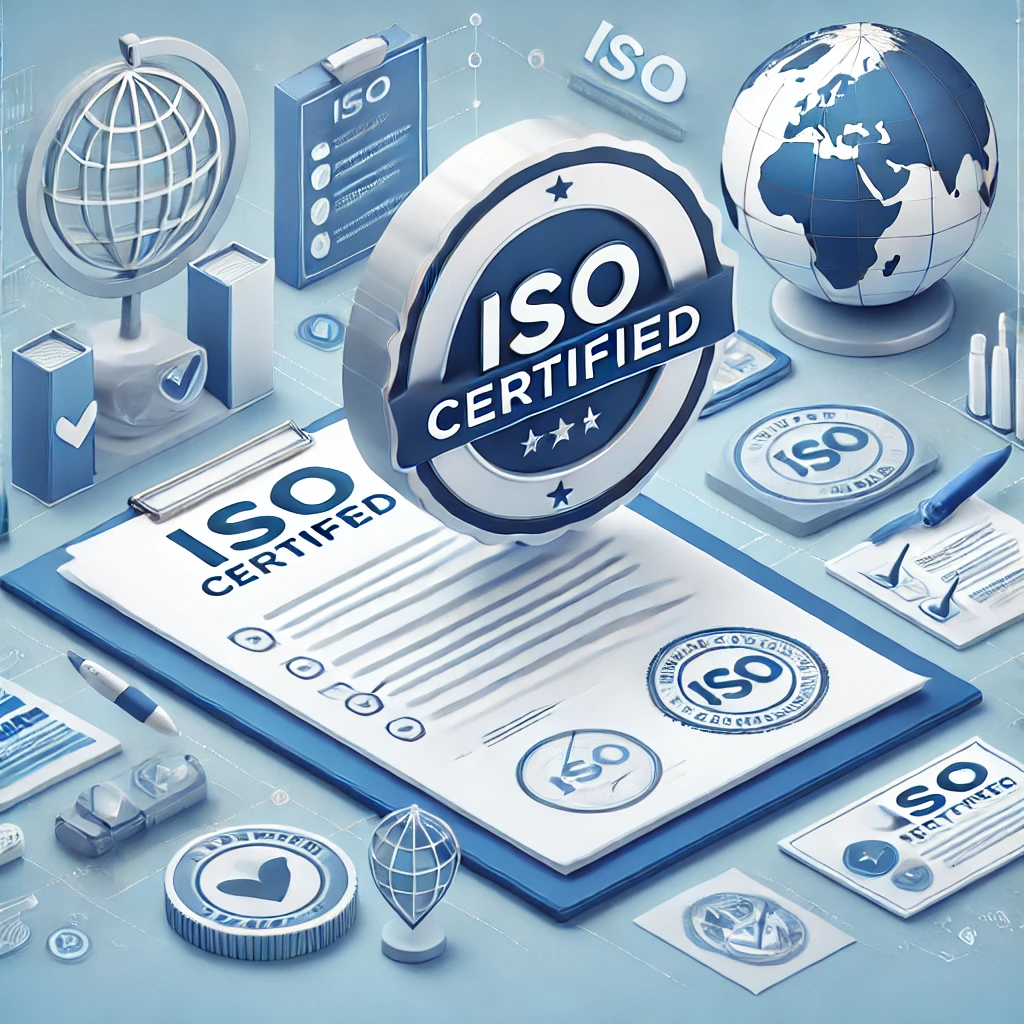Start Business
Start Business
Registration & License
Registration & License
Trademark Filing
Trademark Filing
Goods & Service Tax
Goods & Service Tax
Income Tax
Income Tax
MCA Services
Tender Registration
Tender Registration
Others
ISO Certification in India – Get ISO 9001, ISO 14001 & More with Expert Audit, Documentation & Fast Approval Support
Best & Reasonable Plans
Smart solutions,fair prices - your success starts with the Innovative solutions, competitive pricing – your journey to success begins with the perfect balance for growth!

Overview
ISO (International Organization for Standardization) registration is a globally recognized certification that validates a business's adherence to specific quality, safety, and efficiency standards. These standards are designed to ensure consistency in products and services, enhance customer satisfaction, and improve operational efficiency. ISO certification demonstrates a company’s commitment to maintaining high standards in business operations, risk management, and regulatory compliance. By obtaining ISO registration, businesses can streamline their processes, minimize errors, and establish trust with customers, stakeholders, and regulatory bodies. Additionally, ISO certification boosts credibility, enhances brand reputation, and opens doors to international trade opportunities, giving businesses a competitive edge in the global market.
Key Features of ESI Registration
- • ISO certification enhances global credibility and trust.
- • Helps optimize operations, reducing errors and waste.
- • Improves product/service quality, ensuring higher customer satisfaction.
What is ISO Registration and Why is it Important?
ISO registration is a certification process that verifies whether a company meets internationally recognized standards for quality management, environmental responsibility, information security, and other key areas. This certification is not just a mark of excellence but a structured framework that helps businesses optimize operations, reduce inefficiencies, and improve product or service reliability.
ISO certification is essential for organizations seeking to establish a strong reputation, increase customer confidence, and comply with industry-specific regulations. It provides a structured approach to continuous improvement, allowing businesses to identify risks, enhance efficiency, and reduce costs. Additionally, ISO registration facilitates smooth trade and partnerships by demonstrating compliance with global standards, making it easier to expand into new markets. Whether a company operates in manufacturing, healthcare, IT, or any other industry, ISO certification ensures a commitment to best practices, regulatory adherence, and long-term business sustainability.
Eligibility Criteria for ISO Registration in India
- ✔ Type of Business :Any organization, regardless of its size, nature, or industry, can apply for ISO registration, including startups, small businesses, corporations, and NGOs.
- ✔ Legal Existence :The business must be legally registered under the applicable laws in India, such as a sole proprietorship, partnership, LLP, private limited company, or public limited company.
- ✔ Defined Processes :The organization should have a structured management system, documented policies, and standard operating procedures to comply with ISO requirements.
- ✔ Compliance with Industry Standards :The company must meet the regulatory and statutory requirements related to its industry before applying for ISO certification.
- ✔ Commitment to Quality Improvement :The business should demonstrate a commitment to continuous improvement, quality management, and customer satisfaction to qualify for ISO certification.
- ✔ Internal Audits and Documentation :The organization must conduct internal audits, maintain records, and implement corrective actions to ensure compliance with ISO standards before undergoing external certification audits.
- ✔ Commitment to Quality Improvement :The business should demonstrate a commitment to continuous improvement, quality management, and customer satisfaction to qualify for ISO certification.
Stay Ahead in the Industry with ISO Standardization
In today's competitive market, businesses must continuously evolve to maintain a strong position. ISO standardization provides a framework for improving quality, efficiency, and compliance with international best practices. By obtaining ISO certification, companies demonstrate their commitment to excellence, gaining a competitive edge in both domestic and global markets. ISO certification not only enhances customer trust but also streamlines internal processes, reducing operational costs and improving overall productivity. It helps businesses comply with industry regulations, attract more clients, and build a strong reputation. With ISO standardization, organizations can stay ahead of competitors by ensuring consistent quality, minimizing risks, and continuously improving their products and services.
Silent Features
Enhances Risk Management
Boosts Global Recognition
Increases Employee Efficiency
Reduces Operational Errors
Facilitates Government Tenders
Improves Data Security & Confidentiality
Advantages of ISO Registration
- Optimized Resource Utilization : ISO certification ensures better management of resources, reducing waste and improving overall efficiency.
- Higher Customer Retention : Adhering to ISO standards improves product and service quality, leading to increased customer loyalty and satisfaction.
- Competitive Edge in the Market : ISO-certified businesses stand out from competitors, attracting more clients and partnerships.
- Faster Business Growth : Standardized processes lead to smooth operations, making business expansion and scalability easier.
- Better Crisis Management : ISO standards prepare businesses to handle disruptions, ensuring continuity during unforeseen challenges.
- Encourages Innovation :ISO certification promotes continuous improvement, pushing businesses to adopt new technologies and innovative strategies.
Documents Required
Certificate of Incorporation / Business Registration
PAN Card of the Business Entity
GST Registration Certificate
Address Proof of the Business
Scope of Business Activities
Quality Management System Documents
Step-by-Step Guide For ISO Registration Process
Here are 5 steps to complete your ISO registration process
Step 1
Select the ISO Standard
Step 2
Prepare Documentation
Step 3
Implement ISO Standards
Internal Audit & Pre-Assessment
Make Initial Contribution Payment
Step 5
Apply for Certification & External Audit
ISO Compliance Requirements for Businesses
Every employer registered under the Employees' State Insurance (ESI) Act, 1948 must adhere to various compliance requirements to ensure timely contributions and benefits for employees. These obligations include submitting monthly ESI contributions, filing returns, and maintaining employee records. Failure to comply can result in penalties, interest charges, or legal actions.
| Form/Requirement | Compliance Requirement | Due Date | Penalty |
|---|---|---|---|
| ISO Registration | Businesses must apply for ISO certification under the relevant standard | Varies based on certification body | Certification delay or rejection |
| Internal Audit | Conduct periodic internal audits to ensure compliance with ISO standards. | Annually or as per requirement | Non-compliance may lead to certification suspension |
| Management Review | Regular management reviews to ensure continuous improvement. | At least once a year | May result in audit failures |
| Corrective Actions | Address non-conformities identified during audits. | Ongoing | Certification suspension or revocation |
| Surveillance Audit | Certification bodies conduct audits to verify continued compliance. | Typically once a year | Risk of losing certification |
Empowering Your Business to Stay Ahead


Ensuring excellence in every aspect of business operations

Helping businesses to stay ahead of the competition effectively

Providing expert guidance for long-term business growth





